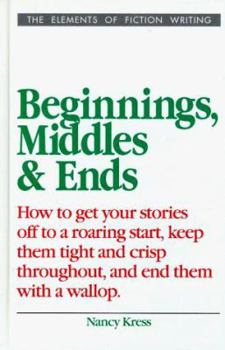Beginnings, Middles and Ends
(Part of the Elements of Fiction Writing Series)
Select Format
Select Condition 
Book Overview
Get Your Readers' Attention--And Keep It--From the First World to the Final PageTranslating that initial flash of inspiration into a complete story requires careful crafting. So how do you keep your... This description may be from another edition of this product.
Format:Hardcover
Language:English
ISBN:0898795508
ISBN13:9780898795509
Release Date:January 1993
Publisher:Writer's Digest Books
Length:160 Pages
Weight:0.33 lbs.
Dimensions:0.7" x 6.2" x 9.3"
Customer Reviews
4 ratings
Great craft book
Published by Mel , 3 months ago
An enlightening read about how to craft stories, long and short, putting names to things I didn't know I knew as vague, shapeless entities. I'll be rereading this frequently. Great gift for writers!
Reasonably Helpful Book on Story Structure
Published by Thriftbooks.com User , 15 years ago
This book gives many good pointers on how to structure your plot and develop your characters as a story progresses. The author has some good advice about the best way to start a story off on a strong foot, and helped me to see that a draft I'm currently working on should probably lose the first few scenes and start closer to the real action (the dropped scenes can be revealed as backstory through efficient use of character dialogue early on so the reader isn't confused). If you are looking for pointers on the actual craft of writing - how best to use adjectives, verbs, nouns; the best way to structure sentences and paragraphs; tips on making good use of metaphor and symbols, etc., then this is not the book for you. This book focuses exclusively on the overall structure of the story. It's also a fairly short book - 143 pages @ 6" x 9" with a moderately large font - but thankfully the author refrains from adding filler and sticks to the efficient dispensing of advise. I would recommend this book to any aspiring authors, particularly anyone who feels that their stories are turning into a quagmire halfway through the first draft, or who are having a hard time deciding the best place to begin.
A recommended treatise on the art of writing fiction
Published by Thriftbooks.com User , 17 years ago
There are plenty of books offering advice to fiction writers out there. I searched extensively for the top three, basing my selection on the following criteria: 1. Publish date > 1990. America of the 1950s is different from America of the 2000s. What readers want to read is different. You want the current dope. The newer, the better, the more relevant, in general. <br /> <br />2. Recommendations from other writers. If no one cares enough to recommend a book, why bother? <br /> <br />3. The writer offering advice should not be a talented freak, with literary genius, but no knack for teaching or relating to fellow mortals. The writer must come across as likable. Teaching calls on different skill sets than writing. Not every writer is cut out to be a teacher. How do you know who's likable and who's not? Google them, for one. Check their wikipedia entry, if any. Examine other published works. <br /> <br />"Becoming Your Own Critique Partner," by Walters & Toombs, is packed with advice, examples, and information, clearly and concisely explained. I recommend this along with Stephen King's "On Writing" and Nancy Kress's "Beginnings, Middles, and Ends." These books aren't just for writers. A reader can become a more educated reader, a more knowledgeable critic, better able to explain his preferences. <br /> <br />King's book, while immensely enjoyable and, to date, my favorite work by him, when it came to actual advice was rather thin. Also, his advice had a cranky tone, owing possibly to his injuries sustained prior to writing it. His book succeeds at being entertaining, but is not especially elucidating. He prefers to go for the punchline (which more often than not connects) rather than reinforce points he considers obvious. His life in itself is interesting and enlightening, however, and he has wisdom to impart of a higher level than technical mechanics. His stories about his life absolutely must not be missed. Recommended. <br /> <br />Kress's book was excellent, but tends to focus on the big picture (namely, as her title says, "beginnings, middles, and ends"). She is mainly concerned with structure, plot, and scenes. Her examples are rather good. Recommended. <br /> <br />"Becoming Your Own Critique Partner" delves deeply into the gory details. You want the gory details. The little things that mean a lot. Prose style. Not using adverbs, of course (all three books expound upon this cardinal rule), but much more. I found a better explanation of POV (Point of View) in this book than in either Kress's or King's. In fact, every lesson was explained better and more clearly here. This book also has more beef. The others are more on the thin side in regards to advice. Kress's and King's books can serve as needed reinforcements. If you have a team of teachers, that's usually better than just one. My plan is to read each of the three books several times.
Do as she says, not as she does
Published by Thriftbooks.com User , 23 years ago
Kress has written a thorough tome on the major sections of novels. Unlike a certain sci fi trilogy she wrote, this manual maintains consistent value to the end. It certainly shines above most of the other Writer's Digest Elements of Fiction series. In a nutshell, the majority of these Elements are poor excuses for writing instruction. But Kress has made her mark, and this one will live long after WD has realized the weak links in its Elements series must be replaced. So ignore the other WD shortcomings, and the implications of the Beggars falterings, and you will be pleased to have purchased an indispensable volume for your reference shelf.






